Suchergebnisse für "Factsheet%3A Energietechnologien gestalten%2C die f%C3%BCr alle sinnvoll und nutzbar sind"
Technologie Portrait Kraft-Wärme-Kopplung (Mai 2002)

Das Technologie Portrait bietet einem Fachpublikum ebenso wie der interessierten Öffentlichkeit ein kompaktes Querschnittsbild des Technologiebereiches Kraft-Wärme-Kopplung.
Hydrogen and fuel cell technology
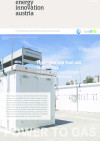
in the energy and transport systems of the future
energy innovation austria
2/2015
Herausgeber: BMVIT und Klima- und Energiefonds
Englisch, 8 Seiten
Downloads zur Publikation
Highlights of Bioenergy Research 2020
January 24th, 2020
Messe Congress Graz, Messeplatz 1, 8010 Graz
National and international results from the IEA Bioenergy Tasks and the ERA-NET Bioenergy
CEPA-Connect
The CEPA energy facade is an innovative building refurbishment system with an external active energy level. The aim is to revolutionize the refurbishment market. The development of the system focuses on holistic solutions for the thermal-energetic refurbishment of buildings.
Fit4Klim - Fit through education for the climate
The aim of the project is to develop and test customised training courses to qualify cities and municipalities in the areas of climate change adaptation and climate protection, spatial planning, green finance, energy and mobility.
IEA Bioenergy Task 40 Newsletter: Halbjahresbericht Juni 2020 - Jänner 2021 (2/2021)

Halbjährlicher Newsletter des IEA Bioenergy Task 40: Bereitstellung biobasierter Wertschöpfungsketten
Herausgeber: IEA Bioenergy Task 40
Englisch, 4 Seiten
Downloads zur Publikation
Smart grid innovations from Austria
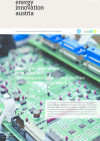
New components and storage facilities for tomorrow‘s energy supply system.
energy innovation austria
2/2018
Herausgeber: BMVIT und Klima- und Energiefonds
Englisch, 8 Seiten
Downloads zur Publikation
IEA 4E EMSA: Policy Brief "Digital Technologies for Motor Systems" (2022)

Dieser Policy Brief beinhaltet eine Kurzfassung des EMSA Berichts zur Klassifizierung von Digitalisierungstechnologien in elektrischen Motorsystemen.
Konstantin Kulterer
Herausgeber: Österreichische Energieagentur, 2022
Englisch, 2 Seiten
Downloads zur Publikation
Topview - Methodology for the efficient use of remote sensing data for climate change adaptation and spatial energy planning
Development of integrated approaches to sustainable energy and heat planning in urban areas by utilising remote sensing data and geo-information-based technologies for decision-making in the planning of energy infrastructures and climate adaptation measures.
Chemical modification of wood particles for high value wood plastic composites
Based on promising preliminary work feasibility and recycling strategy of the modifying process shall be evaluated economically and ecologically.
Cooling Citites
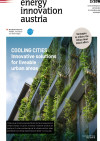
Innovative solutions for liveable urban areas
energy innovation austria
2/2019
Herausgeber: BMVIT und Klima- und Energiefonds
Englisch, 12 Seiten
Downloads zur Publikation
RCC2 - Life cycle assessment of heatable formwork for CO2-reduced and climate-neutral concrete
Experimental development of innovative formulations of CO2-reduced concrete and heated formwork to support early strength development in wintry temperatures.
ReBuildStock - Portfolio management for the decarbonisation of larger housing stocks
Portfolio management method to support the decision-making processes of owners of larger housing stocks in developing strategies for the rapid and socially responsible decarbonisation of their building stock.
Webinar Balanced Heating & Cooling with Radiative Surfaces: Resilient answers to upcoming cooling needs, with new questions for the Comfort Community (2020)

Webinar zum Thema Resilient Ventilative Cooling in der Praxis
Herausgeber: INIVE EEIG – International Network for Information on Ventilation and Energy Performance
Englisch
BioShip - Potentials of Inland Waterways in Securing the Supply of the Austrian Bio-based Energy Industry
BioShip analyses the potentials to optimise and secure the supply chains of the austrian bio-energy plants (forest fuel, biofuel and biogas) with inland water navigation as an environmental friendly way of transport
Building innovations from Austria
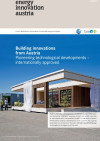
Pioneering technological developments – internationally approved
energy innovation austria
1/2017
Herausgeber: BMVIT und Klima- und Energiefonds
Englisch, 8 Seiten
Downloads zur Publikation
Haus der Zukunft in der Praxis Themenworkshop 12: Innovationen im großvolumigen Wohnbau
23. Okt 2006
FFG, Sensengasse 1
1090 Wien, AT
Themenworkshop aus der Reihe Haus der Zukunft in der Praxis
Decarbonisation of industry
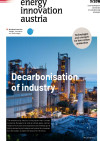
Ways to achieve a zero-emission industry. Innovation is the key for climate-friendly production.
energy innovation austria
3/2019
Herausgeber: BMVIT und Klima- und Energiefonds
Englisch, 12 Seiten
Downloads zur Publikation
Thermo-Active Building Systems - Development of a Calculation kernel (TBA-CALC )
This project result will provide Austria with a uniform software environment for the simulation of thermo-active building systems in the form of a validated tool.
SAFE - Creating a safe school environment together
Tactical urbanism for the temporary redesign of school surroundings to reorganize school mobility in a participatory process. The resulting catalogue of measures will serve as a blueprint for an implementation at other schools in Austria.
